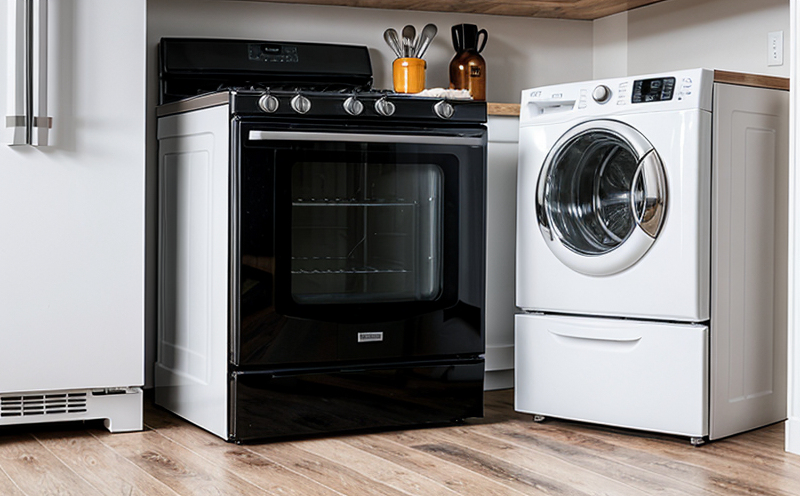Salt Spray Testing for Appliance Components
Understanding the performance and durability of household appliances in various environmental conditions is crucial for product safety and quality. Salt spray testing, also known as salt fog or salt mist testing, simulates the corrosive effects of salt-laden environments on appliance components. This type of testing is particularly important for ensuring that materials used in appliances are resistant to corrosion under real-world conditions.
The process involves exposing specimens to a controlled atmosphere saturated with salt spray. The salt content and pH level can be adjusted according to specific standards such as ASTM B117, ISO 9227, or EN 50018-3:2006. These standards provide detailed procedures for conducting the test accurately.
During testing, the specimen is placed in a chamber where a fine mist of saltwater solution is continuously sprayed onto its surface. The exposure time can vary depending on the required level of corrosion resistance. For instance, some components may need to withstand 24 hours of continuous spray, while others might require up to 96 hours.
Specimen preparation plays a critical role in achieving accurate results. Typically, the surface finish and composition are evaluated before testing. This ensures that the test reflects the true performance characteristics of the component under consideration. After exposure, the specimens undergo inspection for signs of corrosion such as pitting, rusting, or general discoloration.
The results of salt spray testing provide valuable insights into the material's resistance to corrosion. Engineers can use these findings to refine designs and select appropriate materials for future products. Additionally, compliance with relevant regulations is ensured by demonstrating that a product meets specific corrosion resistance requirements.
For quality managers and R&D engineers, salt spray testing offers a reliable method to assess the durability of appliance components. By incorporating this test into their development process, they can identify potential issues early in the design phase, reducing costly rework later on. Compliance officers also benefit from having robust data supporting claims about product longevity and safety.
Why It Matters
- Critical for ensuring long-term performance of appliance components in harsh environments.
- Helps meet regulatory requirements related to product safety and quality.
- Reduces the risk of premature failure due to corrosion, enhancing user satisfaction.
- Promotes the use of high-quality materials that can withstand various environmental conditions.
The importance of salt spray testing cannot be overstated. It ensures that appliances not only meet but exceed expectations regarding durability and safety. By conducting this test, manufacturers can gain a competitive edge by producing reliable products trusted by consumers worldwide.
Why Choose This Test
- Provides conclusive evidence of component resistance to salt-based corrosion.
- Saves time and resources compared to real-world exposure methods.
- Offers controlled conditions that can be adjusted for specific material properties.
- Facilitates compliance with international standards like ASTM B117, ISO 9227, and EN 50018-3:2006.
Selecting salt spray testing offers numerous advantages over other types of corrosion tests. It allows for precise control of environmental variables, ensuring accurate assessment of material performance under defined conditions. This precision is invaluable when making decisions about component selection and design improvements.
Customer Impact and Satisfaction
- Promotes trust in the brand by demonstrating commitment to product quality.
- Ensures reliability, which leads to higher customer satisfaction rates.
- Reduces warranty claims due to premature failure of components.
- Maintains a positive reputation among consumers who value durability and safety.
The impact on customers is significant. By choosing products that have undergone rigorous salt spray testing, users can expect appliances with superior longevity and reliability. This translates into peace of mind knowing they are investing in high-quality goods. Moreover, satisfied customers contribute to brand loyalty, driving continued business success.





